Linda Capps
Vice-Chairman
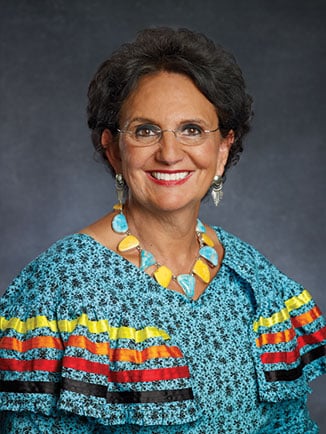
Bozho (Hello),
Citizen Potawatomi Nation held a graduation celebration on April 29, 2023, from noon to 2 p.m. at the Cultural Heritage Center. The event began in 2019 with a large group in attendance with students from as far away as California. The next year was the beginning of the pandemic; therefore, there was no attempt to have the graduation, but in 2021, we had a virtual celebration. Then in 2022, we went back to in-person attendance. Each year, several students come from out of state to participate. The 2023 eligible students were those graduating in the summer 2022, fall 2022 or spring 2023 from high school, trade school or any level of college. Students who could not attend in person were encouraged to register to be eligible for a special gift and recognition in the slideshow, which was presented at the event.
I was honored to have the opportunity to speak to the graduates and families this year. It was somewhat of a reunion for me because I knew many of the families in attendance but had not seen some of them for years. In fact, I hurried to the gift shop during lunch to purchase some gifts like CPN gives away during our district meetings. It seemed fitting since some of our attendees had traveled such a long distance.
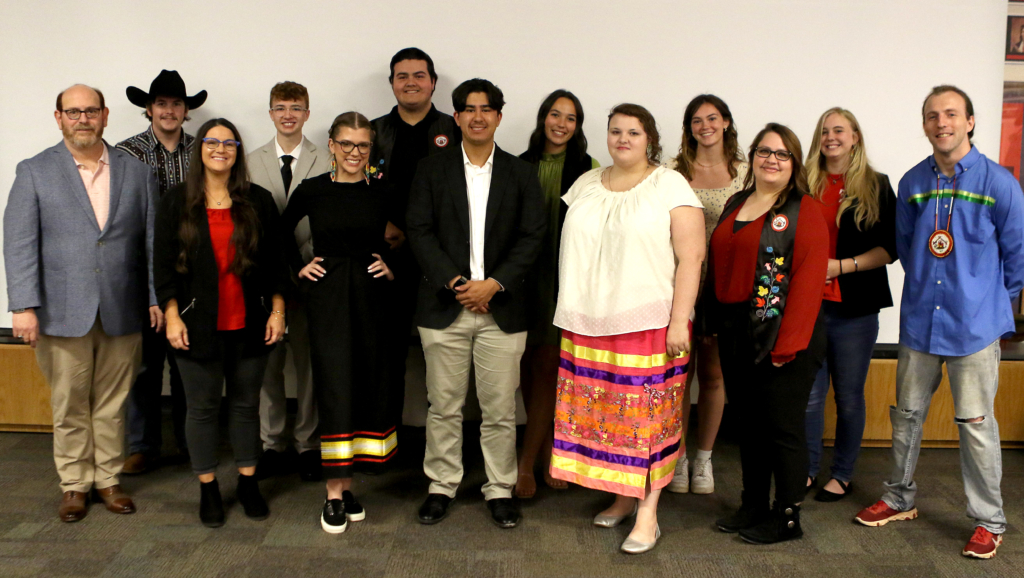
Don Moutaw from Tecumseh, Oklahoma, was presented a Pendleton blanket for being the eldest in attendance. Don is 72 years old with a birthday right around the corner. Our youngest enrolled Tribal member was Bodie Payton, age 3, from Stillwater, Oklahoma. Bodie was given a woven basket, which he seemed to thoroughly enjoy. The two that traveled the longest distance were Brissa Black from Carlisle, Pennsylvania, and Abagail Watson from Saint Paul, Minnesota. Brissa and Abagail were given a pitcher from a collection that was specially made for the CPN Gift Shop. The gifts were greatly appreciated by those receiving a prize.
The graduation was an excellent event, complete with cultural activities, including presentations by the men’s and ladies’ drum groups. Each graduate was called to the front of the Long Room and presented gifts from the CPN Department of Education — a print by CPN artist Penny Coates and an eagle feather. These prints reproduced from the original painting are the only ones in existence. It is a true bonus for the students to receive such a beautiful, limited art piece presented by the education department.
Citizen Potawatomi Department of Education provides training and leadership as well as the scholarships — all to help expand educational opportunities for Tribal members. The education staff process and monitor all student scholarships, which is a huge undertaking. Countless CPN tribal members throughout the U.S. have benefited from the educational funding that is provided by the Tribe. The education staff members also provide students with information about additional funding sources besides the CPN scholarships. The education employees are beneficial to the entire CPN operation and are often requested to assist the Tribe with special events and programs.
Charles Lee III was named interim director of the department in April of this year after Tesia Zientek resigned from the position. He is following in Tesia’s footsteps in providing professional leadership for the program. Charles and his team members were responsible for this year’s graduation celebration — Rachel Watson, Kym Coe and Matt Higdon, all of whom are exceptional in their educational roles.
The graduation celebration for next year will be scheduled again in May. We will be celebrating the summer and fall 2023 and spring 2024 graduates. Please keep this in mind if you have loved ones that will be graduating. I look forward to seeing family of graduates next year. As always, I cherish serving as your Vice-Chairman.
Migwetch (Thank you),
Linda Capps | Segenakwe (Black Bird Woman) | Vice-Chairman |
Work: 405-275-3121 | Cell: 405-650-1238 | lcapps@potawatomi.org
Eva Marie Carney
District 2
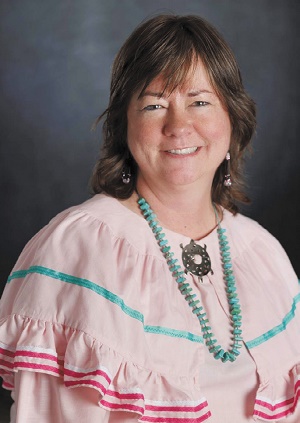
Bozho, nikanek (Hello, friends),
VA Aid and Attendance benefit and Housebound allowance
I spent the last week of April in New Mexico, visiting some of the schools and programs The Kwek Society supports with period supplies. I traveled with our board member and Albuquerque resident Lisa Witt. Lisa and her husband, Tom, own and operate senior living communities in New Mexico, Nevada and Texas. During our visit, Lisa mentioned the VA Aid and Attendance benefit and Housebound allowance. I’m sharing the information here and ask you to share it widely with your networks.
The program provides monthly payments added to the amount of a monthly VA pension for qualified veterans and survivors. Lisa reported that the current benefit amounts are between $1,250 and $3,017!
VA Aid and Attendance eligibility
You may be eligible for this benefit if you get a VA pension and you meet at least one of these requirements.
- You need another person to help you perform daily activities such as bathing, feeding and dressing
- You must stay in bed — or spend a large portion of the day in bed — because of illness
- You are a patient in a nursing home due to the loss of mental or physical abilities related to a disability
- Your eyesight is limited (even with glasses or contact lenses you have only 5/200 or less in both eyes or concentric contraction of the visual field to 5 degrees or less)
Housebound allowance eligibility
You may be eligible for this allowance if you get a VA pension and you spend most of your time in your home because of a permanent disability.
Lisa provided more details on program eligibility, based on her experience:
- Veteran over age 65, who served during war time, with honorable, medical or general discharge (no flexibility)
- Surviving spouse, married to the qualified veteran at the time of death (no flexibility)
- Needs some care assistance or a protected living environment (some flexibility)
- Assets less than $123,000, excluding home value and personal property (some flexibility)
- Must not be receiving a benefit for wounds suffered during service (some flexibility)
How do I apply?
You can apply in one of these ways:
- Send a completed VA form to your pension management center (PMC)
- Fill out VA Form 21-2680 (Examination for Housebound Status or Permanent Need for Regular Aid and Attendance) and mail it to the PMC for your state. (You can have your doctor fill out the examination information section.)
- If you’re in a nursing home, you’ll also need to fill out a Request for Nursing Home Information in Connection with Claim for Aid and Attendance (VA Form 21-0779).
- Apply in person — bring your information to a VA regional office near you.
Links to the needed forms and more details are on the VA’s website, va.gov.
As you might expect, the application process can be challenging to navigate. Lisa and Tom work with one of the many companies that offer advisory and application assistance to veterans and their families, Patriot Angels (patriotangels.com). All the companies charge for their services. I understand that the VA review process can take three to four months after you submit the formal application, and that benefits, if awarded, will be back-dated, effective to the date of submission.
Loss of a dear Potawatomi veteran
I’m offering condolences to the family members and friends of Robert Pearl/Kiwezi, who walked on in late April. Bob was an honored veteran, a true gentleman and a great dancer. He attended several of the meetings and events I’ve hosted. I’ve included a photo I took of him during one of our trips to the NMAI Archives. May his memory be a blessing.
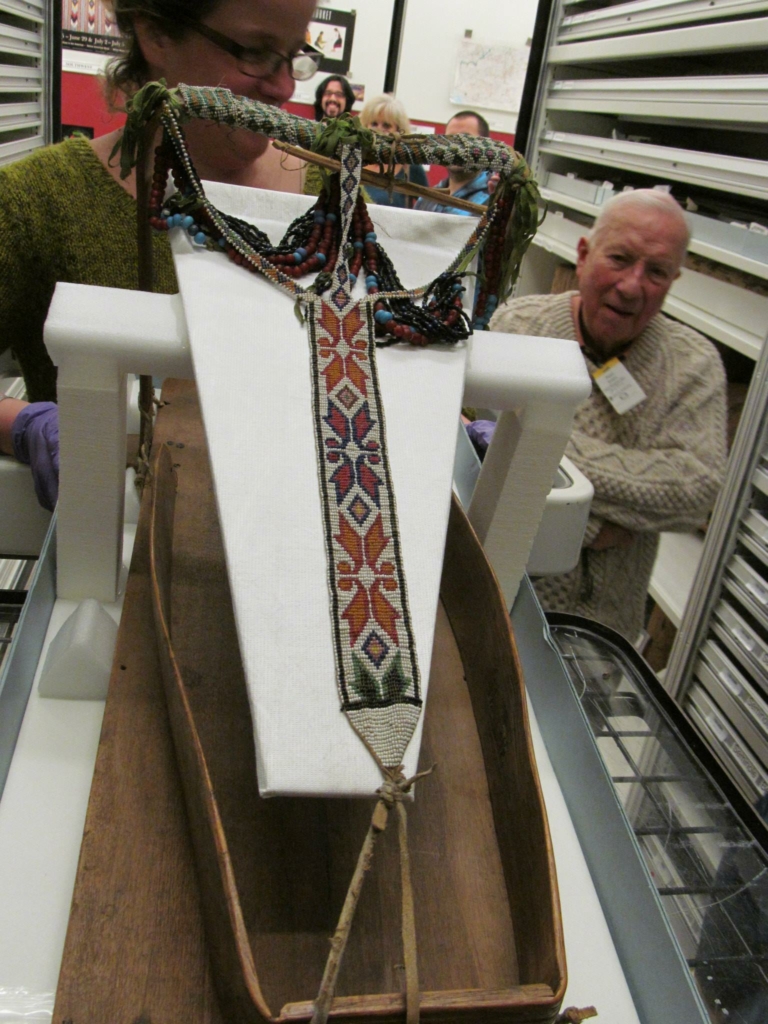
Please keep in touch
I look forward to hearing from you and to greeting some of you in person at our Family Reunion Festival at the end of this month! Migwetch (thank you) for the honor of representing you.
Eva Marie Carney | Ojindiskwe (Bluebird woman) | ecarney@potawatomi.org |
evamariecarney.com | evamariecarney@gmail.com | 5877 Washington Blvd. PO Box 5591 | Arlington, VA 22205 | Toll Free: 866-961-6988
Bob Whistler
District 3
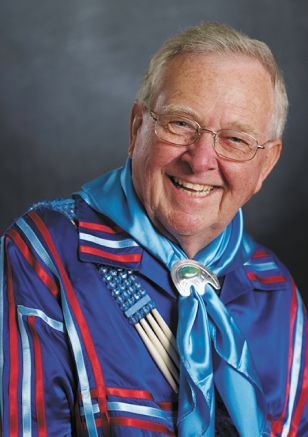
Bozho Nikan (Hello friend),
Ghost Dance
In mid-April, I made a short visit to South Dakota. While there, I stopped in Chamberlain and visited the Akta Lakota Museum & Cultural Center out of St. Joseph Indian School. They have a wonderful display of their history along the same lines as our Cultural Heritage Center near Shawnee. One item in particular that I found interesting was a display of the shirt and shield worn by a leader of the Ghost Dance. It was a religious ceremony created by the Great Plains nations and gained prominence under a Paiute Indian named Wovoka in the fall of 1869. This ceremony promised the renewal to the Indians, return of horses and bison, and that the white man would disappear. In addition, the ghosts of their ancestors would return, and mother earth would become as it had been before the white man arrived. I am including a photo of this exhibit. The Ghost Dance scared the Indian agents, and the government called for the arrest of the leaders. They created the Religious Crimes Code in 1883 that banned Native dances and ceremonies. On Dec. 15, 1890, Sitting Bull was killed while being arrested. The code was repealed in the 1970s. This is one of the methods used to try restricting our cultural identity.
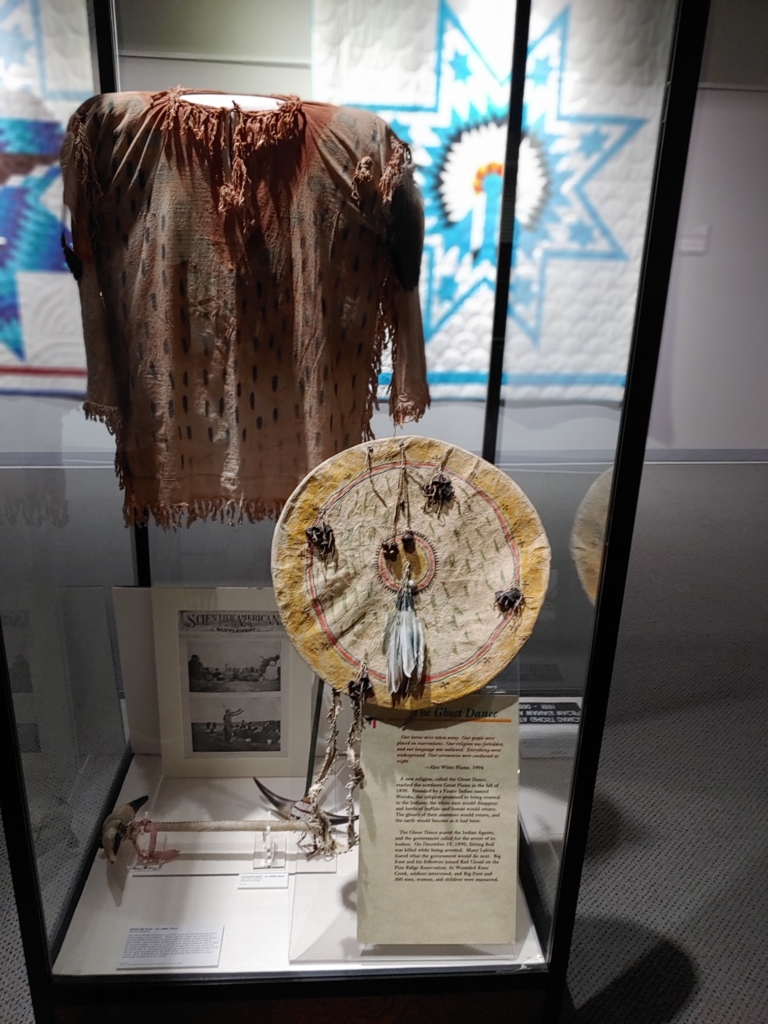
Hiawatha Asylum
The federal government created the Hiawatha Asylum for Insane Indians around 1899, and it was built in 1901 in Canton, South Dakota. The government made it illegal for the Indians to speak their language or talk about Wounded Knee massacre and Little Bighorn. If the Indian police heard that you were doing any of this, they would come to your home. If you argued with them, a rope would be strung between the two horsemen, and they would drag the rope through your crops to destroy them and you would be arrested. You were then taken and admitted to the “living burial site” called the Hiawatha Asylum for Insane Indians. Anyone admitted was never released or heard from again. This was a one-way trip, and you died there. No records were kept as to what killed the 121 Indians buried in the small cemetery there. The facility was checked from 1929 to 1933 and found to have intolerable conditions and abuse of the inmates or so-called patients. In 1933, a new commissioner of Indian Affairs ordered the closing of this facility. It no longer stands. However, a historical marker is located on their property, which is now the Hiawatha Golf Course. The cemetery is located between the fourth and fifth fairways. This facility was just another means of intimidation to discourage the use of their language or their desire to orally pass on history and culture to their descendants.
Mt. Rushmore and Crazy Horse
While in South Dakota, I also visited Mount Rushmore and the Crazy Horse monument. These are two great monuments to see. The town of Keystone is on the edge of the Mount Rushmore National Memorial. It has many hotels, shops and restaurants. Keystone also has a very good museum on some history of our U.S. presidents. The Crazy Horse monument is about 11 miles beyond on the same basic road. You are in the Black Hills that the Sioux nations loved.
My trip was for more information on the high school American Indian Native Studies ethnics class I am working on with the Grand Prairie School District that ultimately may be used in all Texas high schools.
I thank the CPN citizens in District 3 for allowing me to represent you. I am your voice, so contact me if you have questions on benefits or services.
Nagech (Later),
Bob Whistler | Bmashi (He Soars) | rwhistler@potawatomi.org | cpn3legislator@yahoo.com | 1516 Wimberly Ct. | Bedford, TX 76021 | 817-229-6271 | cpndistrict3.com
Jon Boursaw
District 4
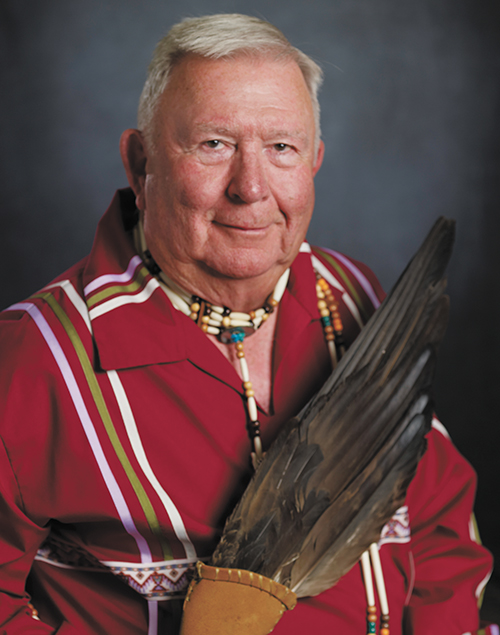
Bozho (Hello),
Kansas Academic Council for Indigenous Education (KACIE)
Back in January, Vice-Chairman Capps asked if I would serve on the Kansas Academic Council for Indigenous Education (KACIE) along with Tesia Zientek, who was then the CPN Director of Education. The plan was that I would attend the Council meetings in person, while Tesia would attend via Zoom. The Council is an advisory body for the Native Nations in Kansas, the Kansas Board of Education (KSBOE), its Department of Education (KSDE) and the State Board of Regents (KSBOR) with the primary goal to strengthen government-to-government relationships to ensure adherence to existing education laws and policies for the purpose of improving education for, about, and with Indigenous peoples and communities in Kansas.
The primary organizer and administrator of the Council is Dr. Alex Red Corn, member of the Osage Nation. He is on the staff in the College of Education at Kansas State University, where he serves as an Assistant Professor of Educational Leadership, Coordinator of Indigenous Partnerships, Co-chair of the Indigenous Faculty and Staff Alliance, Executive Director of the Kansas Association for Native American Education (KANAE) and Program Coordinator for the Indigenous Educational Leadership Graduate Certificate.
The Council is comprised of two voting representatives from the four federally-recognized tribes in Kansas (Prairie Band Potawatomi, Kickapoo, Sac & Fox and Iowa) and one each from the KSBOE, KSDE, and KSBOR. In addition, there are several non-voting members consisting of a representative from the Bureau of Indian Education, one member of the Kansas legislature, one individual from the Governor’s Executive staff and one each from up to the five of the federally recognized tribes residing outside of Kansas with histories and connections to Kansas. These currently include the Osage, Kaw, Shawnee, Delaware, and Citizen Potawatomi tribes located in Oklahoma. It is estimated that CPN has close to 600 students attending public schools in Kansas.
The primary objective of Council is that, in the near future, all Kansas public schools will have Indigenous studies as part of their curriculum in grades 1 through 12. This has already been accomplished in several states such as Michigan, Montana, Alaska, Oregon and North Dakota.
Since January, I have attended meetings in Wichita, Topeka, Lawrence and at the Prairie Band Potawatomi. The May meeting was scheduled to be hosted by the Royal Valley School District in Hoyt, Kansas, which serves the students from the Prairie Band Potawatomi Reservation.
Upcoming CPN Elders’ Potlucks
The dates for the next two Elder Potlucks held in CPN Community Center in Rossville at noon are:
- June 9th Hamburgers & hot dogs | RSVP by the 6th
- July 14th Roast beef, mashed potatoes & gravy | RSVP by the 11th
Join us and bring your favorite side dish or dessert. If you plan to attend, please RSVP to Tracy at 785-584-6171.
Update on 8th Grade Student’s History Day Competition
Remember Madison Arnold, the Topeka 8th grade student who entered the Kansas State History Day Competition with the Potawatomi Trail of Death as her subject? I am pleased to report that Madison placed second in the Junior Division Individual Exhibits and is now eligible to enter the National History Day Competition this summer in Washington, D.C. Madison has accepted our invitation to speak at the June 9th Elders’ Potluck in Rossville.
I look forward to seeing you at the CPN Family Reunion Festival.
It is an honor to serve as your legislator.
Megwetch (Thank you),
Jon Boursaw | Wetase Mkoh (Brave Bear) | jon.boursaw@potawatomi.org | 2007 SW Gage Blvd. | Topeka, KS 66604 | 785-608-1982 | Office Hours: Tuesday 9-11 a.m. | Thursdays 3-5 p.m. | Other times as requested
Gene Lambert
District 5
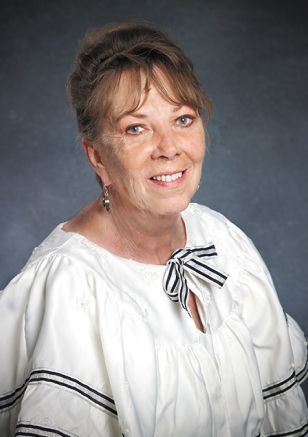
Bozho (Hello),
Upcoming exciting times as June is the month of the Family Reunion Festival for the Citizen Potawatomi Nation. It is the most important gathering of the year for us.
We have our district meetings throughout, contributing to the comradery, but CPN members look forward to the fantabulous festivities available when we go home.
The Arizona District 5 2023 was our first meeting kicking off a wonderful year of family reunions.
We went back to the San Marcos Hotel in Chandler, Arizona, where we had our first group of namings many years ago. I remember the namings were announced at the Boy Scout Park and continued until midnight. Wow! It was also the year I received my name, too.
This year was no exception. While there was not a naming, we did have a Zoom get-together with Chairman John “Rocky” Barrett, Ms. Linda Capps, Vice-Chairman, and of course Justin Neely, director of our Language Department.
It would have been perfect except for my inability to get logged in to the meeting for 15 minutes that seemed like an hour at the time.
We really appreciated Chairman Barrett taking the time on his weekend to talk to us about new projects and answering questions. Ms. Capps, as usual, shared a lot about benefits available to our people and specifically reiterated information about CPN Care and provided a number you can call (888-565-3303) as there had been so many questions. Justin Neely opened the door for some with the Potawatomi language, what words sound like and mean in English. His special multifaceted talents allowed a few wonderful Native puppet stories for the children with animation and all. Quite entertaining. Everyone loved it! I think the adults enjoyed it more than the children. I know I did! We simply needed more time to spend with them. While being there in person works best, the opportunity to see and talk to our leadership on Zoom is the next best thing.
Our new District 5 member Scott Holzmeister had just a few minutes to update us about his involvement with the research into ancestral burial grounds in Kansas. Again, I wish we had more time.
Our drawings took place as traditionally practiced, and Ms. Janet Lunsford from Yuma, Arizona, won the wisest person of the day. What a beautiful lady inside and out.
Little Jesse Watkins from Prescott Valley, Arizona, was the youngest at 1 year old. He is the son of Jordan and Ashley Watkins, and great-grandson of Joy Esch. Wow! Time does fly.
The greatest distance traveled went to Mr. Cashion C. Hodam, who traveled from South Korea where he has been teaching for the last two years. He is now wanting to teach here in the USA, and we wish him well.
We always take the time to introduce each table and the Native family names, allowing others to identify with ancestral backgrounds.
This is what it is all about. Family!
It was great to see everyone, as always, and I appreciate your tolerance of my imperfection over the years. You have taught me so much about love and life.
Please let me know if you are new to our district so we can stay in touch for future activities.
Love you all,
Gene Lambert (Eunice Imogene Lambert) | Butterfly Woman | glambert@potawatomi.org | 270 E Hunt Highway Ste 229 | San Tan Valley, AZ 85143 | Cell: 480-228-6569 | Office: 480-668-0509
Dave Carney
District 8
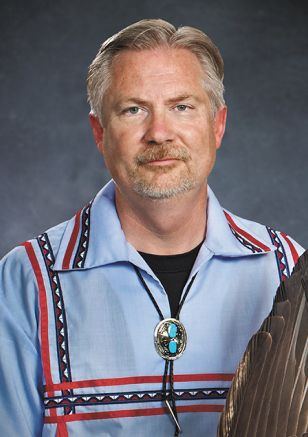
Bozho, nikan (Hello, friend),
Well, it seems like the switch has been flipped from winter to summer here is the northwest. Sunny and 60 at the end of April. Tulips and daffodils blooming, birds chirping — the whole scene. Time to spend hours cleaning up — weeding, pressure washing and, in general, getting the green mildew off the gutters, siding and outdoor furniture. And most of us in the northwest wouldn’t live anywhere else!
There are two CPN events set in stone as of now. A summer-time cookout Aug. 5 in the Lacey/Olympia Washington area. Last time we had a similar gathering it was very popular; however, we had it in May, and we had a significant amount of rain. August should be a better bet. Since this will be after the Family Reunion Festival in Oklahoma (end of June), I hope to bring back the latest news and developments from the Nation.
The other event is the Fall Feast — this year, held in Seattle. This will be a mid-day meal with presentations, craft class and art contest. The location will be the Duwamish long house, and the date to save is Oct. 14. Please consider coming if you have not attended one of these before.
Postcards will be out for these two events. You can always RSVP to dcarney@potawatomi.org. This is primarily to get an idea of the volume of food needed. If you’ve ever been to a District 8 meeting, you know that we have not run out of food yet!
Something happened recently in my family, and I thought I’d share it with Tribal members — particularly our elders. My mother-in-law received a call from a person pretending to be one of my children. This is known as the “grandparent scam” and has been around for a few years. The story changes slightly, however, the main gist of it is that the grandchild is in jail (could be hospital) in another state (or country) and is in dire straits if a wire of $5,000 to $20,000 is not sent immediately. The scammer may be a great storyteller, embellishing the story with great details. One consistent element is that the grandparent is not supposed to tell the parents, and the target is sworn to this.
This particular scammer was calling from the Connecticut district attorney’s office. My son had apparently struck a pregnant woman in a crosswalk, and $20,000 had to be wired immediately for bail and his defense. What was my son doing in Connecticut? And why did we not know he was across the country for a sudden funeral for a friend? My mother was given a number to call at the “DA’s office” to verify the story — and by gosh, the person who picked up the phone said it was all true.
The only thing that stopped my mother-in-law from wiring her life savings to an offshore bank account was another relative who overheard one of the phone calls. My son had to call her and say, “Grandma, I am home and would never ask you to wire money or not tell my parents.” Friends, don’t fall victim to anyone asking for wires, gift cards or anything else you did not initiate. Once the money is wired, it is gone! Elders beware.
As always, it is my honor to serve as your legislator,
Dave Carney | Kagashgi (Raven) | dcarney@potawatomi.org | 520 Lilly Road, Building 1 | Olympia, WA 98506 | 360-259-4027
Paul Wesselhöft
District 9
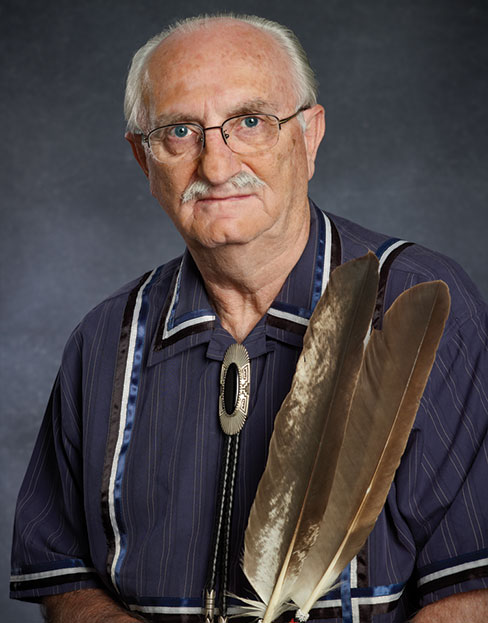
Bozho, nikan (Hello, friend),
Davey Crockett
Congressman David Crockett opposed President Andrew Jackson’s 1830 Indian Removal Act and was the only member of the Tennessee delegation to vote against it. Cherokee Chief John Ross sent Crockett a letter declaring his appreciation for the congressman’s stand against this terrible legislation.
The unpublished mission of the Indian Removal Act was ethnic cleansing. Tragically, the removal of Native Americans was seen as necessary for Manifest Destiny. The act was signed into law by a president who earned the name of “Indian Killer.”
This legislation forced at gunpoint more than 60,000 Indians from at least 18 tribes to move west of the Mississippi River. The southern tribes were resettled mostly in Indian Territory (Oklahoma). The northern tribes were initially resettled in Kansas.
David Crockett’s vote against this inhumane act was unpopular and cost him his political career. He lost his next election. His vote was a historical profile in courage. Eventually, the frontiersman moved to the future state of Texas and was killed fighting for Texas independence at the Alamo. We “remember the Alamo.” We should remember Davey Crockett.
Migwetch (Thank you),
Paul Wesselhöft | Naganit (Leader) | reppaul@gmail.com | pwesselhoft@potawatomi.org
David Barrett
District 10
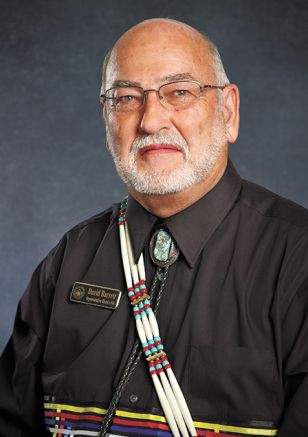
Bozho (Hello),
What do we value most in life? Most people will say that their home is their most important asset because it will normally increase in value as time moves forward. Allow me to suggest that family and friends should also be near the top, if not the top.
A family could include grandparents, aunts and uncles, godparents or close friends. What is important is the love or common interest that binds them together. Family means having someone to love you unconditionally in spite of your shortcomings. Family is loving and supporting one another even when it’s not easy to do so. How many of us would like to say, “Enough is enough!” but continue to inspire your loved ones?
When our love, attention, help, support, forgiveness and acceptance are given to all, whether it is deserved or not, that, to me, would be a special family. During my lifetime, I have seen families interact this way, and other family members would say, “Gosh, I am always doing things right, but I don’t get the same treatment.” It is the best thing about being a family. It is also the basis where we learn to give grace to others outside of our family. Forgiveness can go hand in hand with grace.
God’s definition of a family is the foundational institution of society ordained by God. It is constituted by marriage and is composed of persons related to one another by marriage, by blood or adoption. The family is a fundamental institution of human society (Genesis 2:20-25, 4:1; Exodus 20:5-6; Joshua 7:10, 15, 24-25; 2 Kings 13:23).
There are so many things that you can do to become or develop your family to be a strong family.
- Spend enjoyable time together
- Express appreciation and affection to one another
- Have a strong commitment to each other
- Work together to manage stress and crisis effectively
- Develop a sense of spiritual well-being
You can look inside your family to see some common features of healthy, happy families that include: cohesiveness, open communication, parents leading by example, complicit management, and setting clear expectations and limits.

The family will also develop character in your children through what your child learns through the interactions between you and them. That is what they will carry for the rest of their life in regard to how to treat others. Through this socialization with family, your child will learn how to trust, seek friendships from others and find comfort with others as well.
Families have significantly shifted in terms of structure, going from two-parent households to more selective form of expression of what it means to be a family. While in the 1950s and 60s, there was more of an emphasis on a family including two parents and children. Now families have a much more diverse structure.
Despite the fact that everyone is born to a mother and father, not everyone is born into a loving family. In so many ways, a lack of healthy, loving families can contribute to the breakdown of modern society. Being a part of, or not being a part of, a family has an impact on the decisions and behaviors we take.
To wrap my column up, it’s always family first. Be there for the important moments, birthdays, holidays, Mother’s Day, Father’s Day, weddings, etc. The Potawatomi Family Reunion Festival is another function that brings our extended family together.
Take time to thank a veteran, first responder and a person in blue when you have an opportunity.
It goes without saying that it is both a pleasure and an honor to serve you and our great Nation.
Migwetch (Thank you),
David Barrett | Mnedobe (Sits with the Spirits) | dbarrett@potawatomi.org | 1601 S. Gordon Cooper Dr. | Shawnee, OK 74801 | 405-275-3121
Andrew Walters
District 11
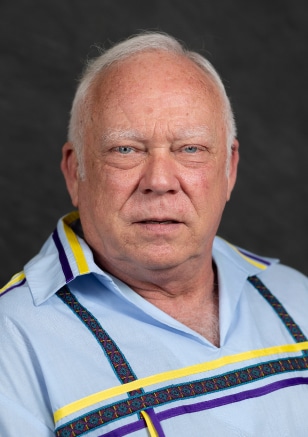
Bozho (Hello),
It’s that time of year. At the end of this month, we will have the Family Reunion Festival and elections for legislators. I don’t know how all that will turn out, but I want to take this opportunity to thank all of the people that have walked beside me on this journey as your District 11 Legislator. Those folks who mentored me, gave me sage advice and even criticized me. I have learned a lot, seen a lot, heard a lot, and am thankful for the experience and folks I have met. I am hopeful to continue my service.
That said, the most important thing about this month is that you exercise your right to vote. Of all the rights given us by the Creator, the right of free choice is the most important. Voting is the lifeblood of democracy. Participation in the Tribe is essential to its continued existence. Like any growing thing, our Tribe needs the rejuvenation brought about by new ideas, new faces and new thinking. Our Tribe needs the new blood of young members exhorting growth and change. But we must not forget the traditions and ideas that have paved the way to the present. The prayers, the songs, the beliefs that have acted to keep us grounded must not be forgotten.
Mamogosnan (Creator), please continue to bless this Tribe and to provide for us all.
Bama pi (Until later),
Andrew Walters | andrew.walters@potawatomi.org | nibwemko@gmail.com
